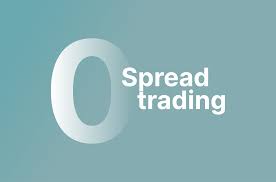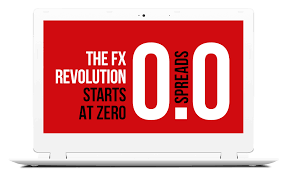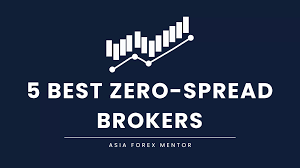When choosing the right forex broker, one of the most important factors to consider is the cost of trading. A zero spread forex broker can offer significant advantages, especially for traders who prioritize low transaction costs. Unlike traditional brokers that charge a spread (the difference between the buying and selling price), zero spread brokers eliminate this cost entirely, making them an attractive choice for active traders, such as scalpers and day traders. In this guide, we'll delve into what zero spread forex brokers are, how they work, and why they might be the best option for those looking to optimize their trading experience.

Understanding Zero Spread Forex Brokers
1. What is a Zero Spread Forex Broker?
A zero spread forex broker is one that offers no spread between the buy and sell price of a currency pair. Unlike brokers who charge a spread—either fixed or floating—zero spread brokers eliminate this cost. For instance, a fixed spread broker will always charge the same spread regardless of market conditions, whereas a floating spread broker adjusts the spread based on market volatility. Zero spread brokers, however, allow traders to execute trades at the exact market price, making them particularly appealing for high-frequency traders and those looking to minimize transaction costs.
2. Advantages of Trading with a Zero Spread Broker
One of the key advantages of trading with a zero spread broker is the cost-effectiveness. Since there are no spreads to pay, traders are charged only a small commission or fee. This makes zero spread brokers particularly attractive to scalpers and day traders who need to execute many trades in a short time and rely on minimizing trading costs. Furthermore, with zero spread brokers, there’s reduced slippage, meaning the difference between expected and actual prices during trade execution is minimized.
3. How Do Zero Spread Brokers Make Money?
Although a zero spread forex broker doesn't charge a spread, they still need to make money somehow. Typically, these brokers make money by charging a commission per trade or by marking up the bid/ask price slightly without it being immediately visible to the trader. For example, even though the spread is advertised as zero, the price you get for a trade might be a little higher than the actual market price. This transparent pricing model is often more predictable for traders compared to traditional spread-based brokers.
| Fee Structure | Zero Spread Broker | Fixed Spread Broker | Floating Spread Broker |
|---|---|---|---|
| Spread Type | Zero | Fixed | Floating |
| Commission Fees | Yes | Varies | Varies |
| Cost Efficiency | High | Moderate | Varies |
| Suitability for Scalping | Very High | Low | Medium |
| Price Transparency | High | Moderate | Low |
4. Risks of Zero Spread Trading
While trading with a zero spread forex broker can be cost-effective, there are risks involved. One of the main risks is low liquidity, which can cause trades to be executed at prices that are worse than anticipated, especially during off-peak hours or during high volatility. Furthermore, although there is no spread, widening spreads during volatile market conditions can lead to unexpected trading costs. It's crucial to choose a broker with reliable execution speed to minimize slippage, and to carefully evaluate their liquidity providers.
5. Who Should Choose a Zero Spread Broker?
A zero spread forex broker is ideal for experienced traders, particularly those involved in scalping or high-frequency trading, who require low-cost execution with fast trade entries and exits. This type of broker is also suitable for traders looking for transparent and predictable pricing. However, beginners should approach with caution, as the lack of spread can sometimes be offset by hidden fees, making it harder to gauge the true cost of trading.

Key Features of Zero Spread Forex Brokers
Understanding the key features of zero spread forex brokers is essential for selecting the best platform. Beyond the elimination of spreads, various factors such as account types, speed of execution, and low-cost trading options all play crucial roles in optimizing trading performance.
1. Low-Cost Trading Features (No Commissions, Zero Spreads)
When evaluating zero spread forex brokers, traders should consider the broker’s fee structure. Brokers offering zero spreads may also provide no commission on trades, making them highly attractive for frequent traders. This model contrasts with brokers who have low-cost spreads but charge commissions, which can quickly add up, especially for active traders. For example, while brokers with low spreads but commissions may seem like a cheaper option initially, the cumulative costs could surpass those of zero spread brokers with no commission.
| Broker Type | Zero Spread, No Commission | Low Spread with Commission |
|---|---|---|
| Total Cost per Trade | Low | Potentially higher |
| Fee Transparency | High | Moderate |
| Best for | Scalpers, day traders | Traders with lower volume |
| Cost Efficiency | Very High | Medium |
2. Fast Execution, Low Latency
Speed and low latency are crucial for zero spread forex brokers, especially for those who engage in high-frequency trading. Low latency ensures that your orders are executed immediately at the best available market price, without delays. Brokers offering fast execution are essential for traders who need to act on market movements in real-time. For scalpers and other active traders, even a small delay can result in slippage, which can negate the benefits of zero spreads.
3. Account Types Suitable for Zero Spread Trading
Zero spread brokers typically offer specialized account types to ensure that their clients get the best trading conditions. ECN accounts and STP accounts, for example, provide direct market access and often feature raw spreads, making them ideal for zero spread trading. Other accounts, such as raw spread accounts, offer transparent pricing but might have additional commissions. Understanding the differences between these account types and how they affect overall trading costs and experiences is essential for selecting the right broker.
| Account Type | Features | Ideal for |
|---|---|---|
| ECN Account | Direct market access, raw spreads | Experienced traders, scalpers |
| STP Account | Low-cost execution, direct routing | Beginners, intermediate traders |
| Raw Spread Account | Transparent pricing, low spreads | Active traders, professionals |
4. Scalping and Hedging in Zero Spread Forex Brokers
Scalping and hedging are important strategies for high-frequency traders, and not all zero spread forex brokers allow these techniques. Scalping involves executing many small trades in quick succession, while hedging involves opening opposing positions to protect against market fluctuations. Brokers that support these strategies tend to offer fast execution, low latency, and flexible conditions. These features are crucial for traders who wish to take advantage of small price movements or manage risk through hedging.

Choosing the Right Zero Spread Forex Broker
Selecting the right zero spread forex broker can be a game-changer for traders looking to reduce costs and improve trading efficiency. This cluster will guide you through the essential criteria for evaluating brokers, the importance of regulatory safety, and a comparison of top brokers offering zero spread accounts.
1. How to Evaluate Zero Spread Forex Brokers: Key Criteria
When choosing a zero spread forex broker, traders should focus on several key criteria: execution speed, fees, platform reliability, and customer support. Fast execution speeds are crucial, especially for active traders, as delays can result in slippage and reduced profitability. Additionally, while zero spreads may seem ideal, it's important to understand any hidden fees, such as commissions or markups. Platform reliability ensures that traders can consistently access their accounts and execute trades without issues. Lastly, customer support plays a vital role in ensuring that any concerns or technical problems are addressed promptly.
| Criteria | Importance | Impact on Traders |
|---|---|---|
| Execution Speed | High | Minimizes slippage and ensures fast trade execution |
| Fees and Commissions | High | Reduces hidden costs and ensures transparent pricing |
| Platform Reliability | Medium | Provides a stable environment for trading without disruptions |
| Customer Support | High | Resolves issues quickly, ensuring smooth trading experience |
2. Regulators and Safety in Forex Trading
Regulation is a critical factor in ensuring that your chosen zero spread forex broker is trustworthy and secure. Reputable regulators such as the FCA (UK), ASIC (Australia), and CySEC (Cyprus) impose strict standards that protect traders from fraud and ensure brokers operate transparently. To verify a broker’s regulatory status, always check the licensing information on the broker’s website and confirm their registration with the relevant regulatory body. A regulated broker is likely to adhere to high standards of financial integrity, making it safer for traders to invest their capital.
3. Top Zero Spread Forex Brokers: Comparative Overview
When it comes to choosing the best zero spread forex brokers, it's essential to compare their offerings based on key features. Some brokers are well-known for their low fees and high-speed execution, while others might excel in customer support or platform features. Below is a brief comparison of top brokers in this category.
| Broker | Spread Type | Commission | Platforms | Regulation | Key Strength |
|---|---|---|---|---|---|
| IC Markets | Zero Spread (ECN) | Low | MT4, MT5, cTrader | ASIC, CySEC | Fast execution, great for scalpers |
| FP Markets | Raw Spread | Low | MT4, MT5 | ASIC, CySEC | Transparent pricing, reliable |
| Pepperstone | Razor (Zero Spread ECN) | Low | MT4, MT5, cTrader | ASIC, FCA | High-speed execution, low latency |
| Exness | Zero Spread | Varies (commission) | MT4, MT5 | FCA, CySEC, FSCA | User-friendly platform, strong support |
Platforms and Tools for Zero Spread Forex Trading
When trading with zero spread forex brokers, choosing the right platform and tools is crucial to enhancing your trading experience. This cluster explores the best platforms, mobile apps, analysis tools, and advanced features that can maximize your zero spread trading potential.
1. Best Trading Platforms for Zero Spread Forex Brokers
For zero spread forex brokers, the choice of platform plays a vital role in executing trades efficiently. Popular platforms like MetaTrader 4 (MT4), MetaTrader 5 (MT5), and cTrader offer seamless integration with zero spread brokers, providing traders with the tools they need for fast execution and transparency. These platforms support a wide range of features including advanced charting tools, automated trading options, and real-time price feeds, ensuring that traders can capitalize on the advantages of zero spread trading.
2. Mobile Trading Apps: Zero Spread Anywhere
With the rise of mobile trading, many zero spread forex brokers now offer mobile trading apps that allow traders to manage their accounts on the go. These apps, available for both Android and iOS, provide access to real-time market data, fast execution, and seamless order placement. Features such as one-click trading, notifications for market changes, and quick access to account settings make these mobile apps highly convenient for traders looking to stay connected to the markets anytime, anywhere.
3. Charting and Analysis Tools for Zero Spread Trading
For traders who rely heavily on technical analysis, charting tools are indispensable. Platforms like MetaTrader and TradingView offer advanced charting capabilities, including a variety of indicators, customizable timeframes, and drawing tools. These platforms allow traders to perform in-depth analysis of currency pairs with zero spread brokers, providing the insights needed to make informed trading decisions. By using these tools, traders can optimize their entry and exit points, reducing the impact of slippage and market fluctuations.
| Platform | Key Features | Ideal For |
|---|---|---|
| MetaTrader 4 | Customizable indicators, Expert Advisors (EAs), automated trading | Retail traders, scalpers |
| MetaTrader 5 | Advanced order types, more timeframes, better charting | Advanced traders |
| TradingView | Cloud-based, social trading, vast library of indicators | Day traders, swing traders |
4. Importance of Multi-device Trading
Multi-device trading ensures that you can access your zero spread forex broker account on various devices, including desktops, tablets, and smartphones. This flexibility allows traders to stay updated on market movements and execute trades without being tied to a single device. Brokers that support cross-device trading offer synchronization, ensuring that all your positions and settings are updated in real-time across all platforms. For active traders, this ensures no opportunity is missed, no matter where they are.
5. Auto Trading and Expert Advisors for Zero Spread Accounts
Automated trading is an essential tool for those using zero spread accounts. Expert Advisors (EAs) and trading bots can execute trades based on pre-set strategies, taking advantage of market opportunities 24/7. For zero spread traders, using automated systems can ensure they benefit from fast execution without needing constant manual oversight. With advanced settings, traders can optimize risk management, entry points, and trading volumes, allowing for efficient use of zero spread brokers.
6. Trading View vs MetaTrader: Which is Better for Zero Spread Trading?
When choosing a platform for zero spread trading, MetaTrader and TradingView each offer unique advantages. MetaTrader is favored by many for its customizable features, automated trading options, and robust market execution. On the other hand, TradingView excels with its intuitive interface, extensive charting capabilities, and social trading options, making it perfect for traders who focus on technical analysis. Depending on your trading style, you can choose the platform that best suits your needs, both offering features tailored for zero spread trading.
Conclusion
In conclusion, choosing the right zero spread forex broker is essential for optimizing your trading strategy and minimizing costs. Understanding the core features of these brokers, from fast execution speeds to advanced trading platforms, is crucial for making an informed decision. Additionally, evaluating the safety and regulatory standards of your chosen broker is vital for ensuring a secure trading environment. By leveraging the right tools and platforms, such as MetaTrader 4/5 or cTrader, traders can maximize their profitability while minimizing trading costs. Whether you're a scalper, day trader, or long-term investor, the tools and strategies discussed in this guide will help you select the best broker for your unique trading needs.
A zero spread forex broker offers trading accounts where the difference between the buy and sell price is zero. This means that the broker does not charge a spread on trades, allowing for potentially lower transaction costs. However, traders should be aware of any additional fees such as commissions or account maintenance fees.
Zero spread brokers usually make money through commissions, markups on bids/asks, or swaps. They may charge a small fixed fee per trade or add a premium on the execution price, even if the spread is technically zero.
Yes, regulated brokers offering zero spread accounts can be trusted. Always verify that the broker is licensed by trusted regulatory bodies such as the FCA, ASIC, or CySEC. This ensures the broker operates under strict financial guidelines for transparency and trader protection.
Some of the best platforms include:These platforms offer advanced charting, low-latency execution, and support for zero spread forex brokers, making them ideal for traders seeking efficiency and transparency.
MetaTrader 4 (MT4)
MetaTrader 5 (MT5)
cTrader
No hidden costs: With zero spread, traders can more easily calculate their true trading costs.
Cost-effective for scalpers: Scalping requires precise entry and exit points, and zero spread can minimize slippage and help achieve better execution prices.
Yes, there are potential risks when trading with zero spread brokers, such as low liquidity or the widening of spreads during volatile market conditions. It's also important to understand the broker’s pricing model, as zero spreads might be accompanied by higher commissions or fees.
To verify a zero spread broker’s reliability, check for regulatory oversight, user reviews, and the broker’s history of execution speeds. Reputable brokers are licensed by agencies such as the FCA, ASIC, or CySEC, ensuring transparency and a secure trading environment.
Yes, many **zero spread forex brokers** support automated trading. Platforms like **MetaTrader 4** and **MetaTrader 5** allow the use of Expert Advisors (EAs) and custom scripts to automate trading strategies, making it easier to trade without constant monitoring.






